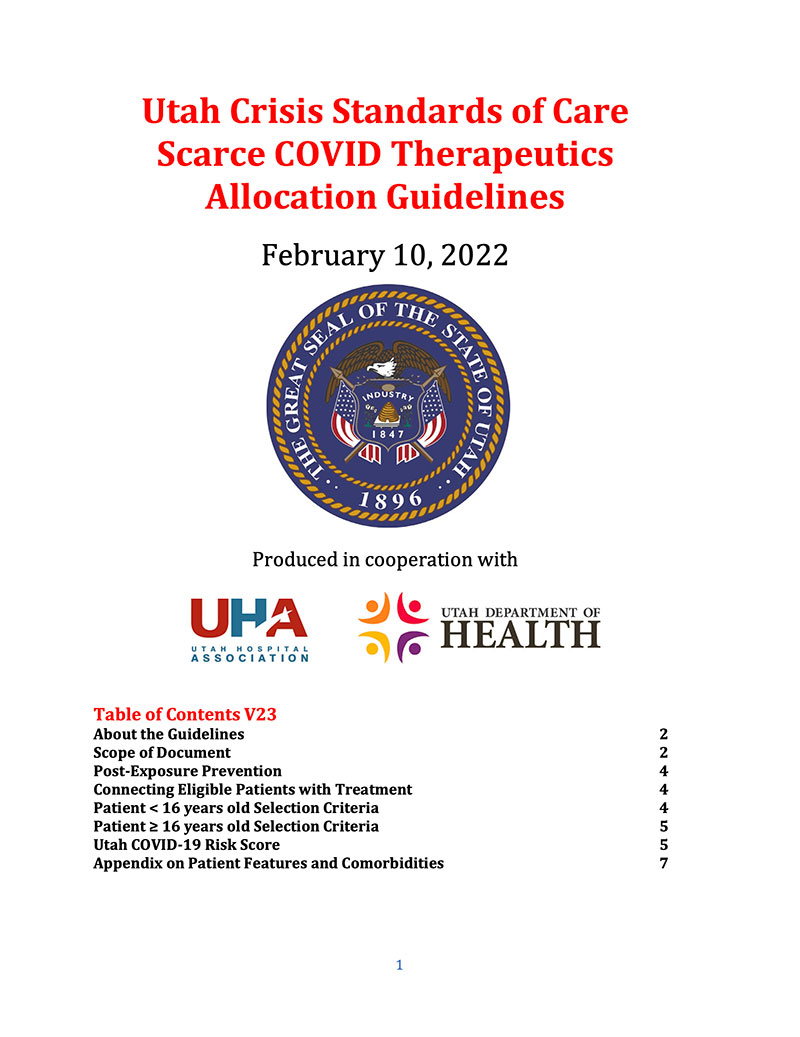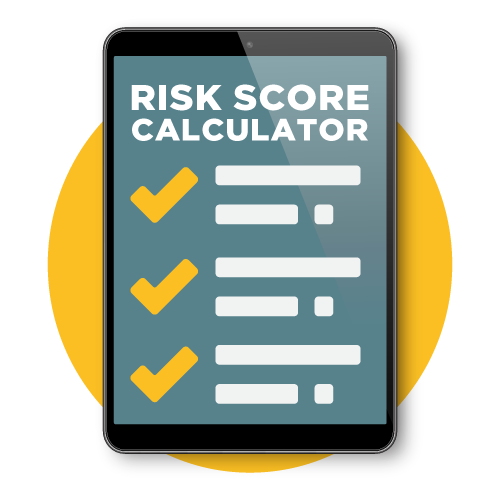COVID-19 treatments -
Information for medical providers
Updated 2/2/2024
Getting vaccinated is the best way for your patients to prevent COVID-19. Encourage your patients to get vaccinated as soon as possible. The Utah Department of Health and Human Services has patient education materials, videos, graphics, and other materials to help you talk to your patients about the risks and benefits of COVID-19 vaccination. Learn more about COVID-19 vaccination.
There are several treatments that can help prevent severe illness or hospitalization from COVID-19, including oral antiviral medications and IV antiviral treatment. These treatments are widely available and effective. Oral antivirals can be prescribed in-office and filled at pharmacies across Utah. The COVID-19 Therapeutics Locator displays public locations that have received shipments of COVID-19 treatments with reported stock on hand within the last day.
We encourage you to become familiar with available COVID-19 treatments. The National Institutes of Health has a current summary of treatment guidelines. The Centers for Disease Control and Prevention Clinician Outreach and Communication Activity (COCA) also has webinars and updates you may find helpful.

COVID-19 therapeutics locator
This interactive map is maintained by the U.S. Department of Health and Human Services. Providers are able to search for therapeutics by therapy and zip code. This tool is for providers only, as these medications require a prescription by a licensed and authorized provider. Patients should not contact locations listed on the locator.
Therapeutics locator
PAXLOVID is our first line treatment.
PAXLOVID is an FDA-approved oral prescription medication that can treat adults who:
- Have mild-to-moderate COVID‑19, and
- Have had symptoms for 5 days or fewer, and
- Have a high-risk factor for progression to severe COVID‑19, such as being 50 years or older or having certain health conditions or lifestyle factors.
PAXLOVID is not approved for use as pre-exposure or post-exposure treatment for prevention of COVID‑19. There are certain medications that should not be taken with PAXLOVID.
Patients must begin taking PAXLOVID within 5 days of symptom onset. PAXLOVID isn’t recommended for patients with severe liver or kidney disease. Additionally, it may interact with other prescriptions a patient might be taking. It is not authorized for people who are hospitalized with COVID-19.
PAXLOVID is taken as a course of 30 pills, a combination of 300 mg nirmatrelvir (two 150 mg tablets) with 100 mg ritonavir (one 100 mg tablet), taken together orally twice daily for 5 days, with or without food.
Renal PAXLOVID: Dosage for patients with moderate renal impairment (eGFR ≥30 to <60 mL/min) is 150 mg nirmatrelvir (one 150 mg tablet) with 100 mg ritonavir (one 100 mg tablet), taken together orally twice daily for 5 days, with or without food.
The prescribing information provides the inclusion criteria for which patients qualify to receive PAXLOVID at this time.
COVID-19 rebound after PAXLOVID treatment
The Centers for Disease Control and Prevention (CDC) issued this Health Alert Network (HAN) Health Advisory to update healthcare providers, public health departments, and the public on the potential for recurrence of COVID-19 or “COVID-19 rebound.”
- Paxlovid continues to be recommended for early-stage treatment of mild to moderate COVID-19 among persons at high risk for progression to severe disease.
- Paxlovid treatment helps prevent hospitalization and death due to COVID-19. COVID-19 rebound has been reported to occur between 2 and 8 days after initial recovery and is characterized by a recurrence of COVID-19 symptoms or a new positive viral test after having tested negative.
- A brief return of symptoms may be part of the natural history of SARS-CoV-2 (the virus that causes COVID-19) infection in some persons, independent of treatment with Paxlovid and regardless of vaccination status.
- Limited information currently available from case reports suggests that persons treated with Paxlovid who experience COVID-19 rebound have had mild illness; there are no reports of severe disease.
For patients with COVID-19 rebound
- There is currently no evidence that additional treatment for COVID-19 is needed for COVID-19 rebound. Based on data available at this time, patient monitoring continues to be the most appropriate management for patients with recurrence of symptoms after completion of a treatment course of Paxlovid.
- Advise people with COVID-19 rebound to follow CDC’s guidance on isolation and take precautions to prevent further transmission. Patients should re-isolate for at least 5 days. Per CDC guidance, they can end their re-isolation period after 5 full days if fever has resolved for 24 hours (without the use of fever-reducing medication) and symptoms are improving. The patient should wear a mask for a total of 10 days after rebound symptoms started.
- Consider clinical evaluation of patients who have COVID-19 rebound and symptoms that persist or worsen.
- Healthcare providers are encouraged to report cases of COVID-19 rebound to Pfizer after Paxlovid treatment using the following online tool: Pfizer Safety Reporting and to FDA MedWatch. Complete and submit a MedWatch form, or complete and submit FDA Form 3500 (health professional) by fax (1-800-FDA-0178). Call 1-800-FDA-1088 for questions.
Molnupiravir (Lagevrio)
Merck’s antiviral medication, Molnupiravir (Lagevrio), is authorized for use in people ages 18 and older who have tested positive for COVID-19, are at high risk of severe illness, and when there are no other COVID-19 treatment options. It is not authorized for use in children. Molnupiravir is also not recommended for use by pregnant women.
Molnupiravir (Lagevrio) can be appropriate when other treatments are contraindicated due to drug-drug interactions or renal impairment. Molnupiravir can be especially useful for residents of long-term care facilities who are on medications with contraindications to PAXLOVID.
A recent study found Molnupiravir significantly accelerated SARS-CoV-2 Omicron RNA clearance in patients with COVID-19.
Molnupiravir dosage is 800 mg (four 200 mg capsules) taken orally every 12 hours for 5 days, with or without food.
Evusheld
As of January 26, 2023, Evusheld is no longer authorized for use in the U.S. Read the FDA announcement here.
Remdesivir (Veklury)®
Veklury is now available nationwide through standard commercial channels.
Veklury (remdesivir) is an antiviral drug that has been approved by the U.S. Food and Drug Administration (FDA) for the treatment of adults and pediatric patients (28 days of age and older and weighing at least 3 kg) with positive results of SARS-CoV-2 viral testing. Veklury is for people who are hospitalized or not hospitalized with mild to moderate COVID-19 symptoms and are at high risk for progression to severe COVID-19, including hospitalization or death.
Veklury is administered as an IV infusion over the course of multiple days. It should be initiated within 7 days of symptom onset. Please see FDA-Approved Drugs: Veklury for a full list of drug specifications.
On April 25, 2022, the FDA approved a supplemental new drug application for Veklury for the treatment of pediatric patients. Veklury was the first approved COVID-19 treatment in the United States. The drug was initially approved for the treatment of hospitalized adults, but is currently approved for the treatment of both hospitalized and non-hospitalized adult and pediatric patients. Veklury was first issued Emergency Use Authorization (EUA) on May 1, 2020.
Monoclonal antibody therapy (Bebtelovimab)
As of November 30, 2022, bebtelovimab is no longer authorized for use in the U.S. Read the FDA announcement here.
Bebtelovimab is not authorized for treatment of mild-to-moderate COVID-19 in geographic regions where infection is likely to have been caused by a non-susceptible SARS-CoV-2 variant based on available information including variant susceptibility to this drug and regional variant frequency.
Bebtelovimab was previously recommended as an alternative treatment for COVID-19. However, it is not effective against the BQ.1 and BQ.1.1 variants. As of November 28, 2022, BQ.1 and BQ.1.1 are estimated to make up 57.1% of circulating variants in Utah according to CDC Nowcast.


